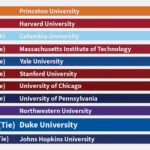Penn State University US News ranking consistently places it among the nation’s top academic institutions. This prestigious ranking reflects Penn State’s commitment to excellence in education, research, and student life. The university’s impressive performance across various categories, including academic programs, faculty quality, and student experience, has earned it a place among the most sought-after universities in the United States.
This article delves into the factors that contribute to Penn State’s high ranking, exploring its strengths and weaknesses across different areas. We will examine how Penn State’s reputation, research output, and student support systems contribute to its overall ranking. We will also analyze the impact of financial aid, campus safety, and diversity initiatives on student success and overall experience.
Penn State University’s Overall Ranking

Penn State University consistently ranks among the top universities in the United States, according to the US News & World Report rankings. Its overall ranking reflects its strong academic reputation, research excellence, and commitment to student success.
Factors Contributing to Penn State’s Overall Ranking
The US News & World Report rankings consider various factors to determine a university’s overall ranking. These factors include academic reputation, graduation and retention rates, faculty resources, financial resources, student selectivity, alumni giving, and social mobility.
Penn State University excels in many of these areas. For instance, its high graduation rate and strong alumni giving demonstrate its commitment to student success and its ability to attract and retain top talent. Penn State’s large endowment also provides substantial financial resources for research and student support.
Ranking by Academic Program
Penn State University boasts a wide range of academic programs, many of which are highly ranked nationally and internationally. These rankings reflect the quality of education, research opportunities, and faculty expertise offered within each program.
Top-Ranked Academic Programs
Penn State University’s top-ranked academic programs are spread across various fields of study. These programs are consistently recognized for their excellence in research, teaching, and innovation.
- Engineering: Penn State’s College of Engineering is consistently ranked among the top engineering schools in the nation. The program is particularly strong in areas such as mechanical engineering, electrical engineering, and computer engineering.
- Business: The Smeal College of Business at Penn State is known for its strong reputation in areas such as finance, marketing, and supply chain management. The program consistently ranks among the top business schools in the country.
- Nursing: Penn State’s nursing program is highly regarded for its clinical excellence and commitment to preparing graduates for leadership roles in the healthcare field. The program is consistently ranked among the top nursing schools in the nation.
- Education: The College of Education at Penn State is renowned for its strong programs in teacher education, educational leadership, and educational psychology. The program is consistently ranked among the top education schools in the nation.
Strengths and Weaknesses of Ranked Programs
The rankings of Penn State University’s academic programs provide insights into the strengths and weaknesses of each program. These rankings can be used to identify areas where the program excels and areas where it may need improvement.
- Engineering: Penn State’s engineering program is known for its strong research focus and its commitment to preparing graduates for careers in a variety of industries. However, the program may face challenges in attracting and retaining top faculty due to competition from other top engineering schools.
- Business: The Smeal College of Business at Penn State is known for its strong industry connections and its commitment to preparing graduates for leadership roles in the business world. However, the program may face challenges in adapting to the rapidly changing landscape of the business world.
- Nursing: Penn State’s nursing program is known for its strong clinical training and its commitment to preparing graduates for careers in a variety of healthcare settings. However, the program may face challenges in keeping pace with the growing demand for nurses in the United States.
- Education: The College of Education at Penn State is known for its strong research focus and its commitment to preparing graduates for careers in a variety of educational settings. However, the program may face challenges in adapting to the changing needs of the education system.
Program Ranking Changes
Penn State University’s academic programs have experienced both significant improvements and declines in their rankings over the past few years. These changes reflect the program’s efforts to adapt to the changing landscape of higher education and to meet the evolving needs of students and employers.
- Engineering: Penn State’s engineering program has seen a slight decline in its rankings in recent years. This decline may be attributed to increased competition from other top engineering schools. However, the program remains highly ranked and continues to attract top students and faculty.
- Business: The Smeal College of Business at Penn State has seen a slight improvement in its rankings in recent years. This improvement may be attributed to the program’s efforts to strengthen its industry connections and to enhance its curriculum.
- Nursing: Penn State’s nursing program has seen a significant improvement in its rankings in recent years. This improvement may be attributed to the program’s efforts to expand its clinical training opportunities and to increase its focus on preparing graduates for leadership roles in the healthcare field.
- Education: The College of Education at Penn State has seen a slight decline in its rankings in recent years. This decline may be attributed to the program’s efforts to adapt to the changing needs of the education system. However, the program remains highly ranked and continues to attract top students and faculty.
Penn State’s Reputation and Impact
Penn State’s reputation plays a significant role in its high US News ranking. A strong reputation attracts top students, faculty, and research funding, further enhancing the university’s academic standing.
Penn State’s Reputation Factors
Penn State’s reputation is built on a foundation of excellence in research, a vast alumni network, and a distinguished faculty.
- Research: Penn State is a leading research institution, consistently ranked among the top universities in the nation for research expenditures. This commitment to research attracts talented faculty and students, fosters innovation, and contributes to the university’s academic reputation. For example, Penn State researchers are at the forefront of advancements in fields like materials science, medicine, and agriculture, attracting significant funding from government agencies and private foundations.
- Alumni Network: Penn State boasts a vast and influential alumni network spanning diverse industries and professions. This network provides valuable connections for current students and graduates, enhancing career opportunities and strengthening the university’s reputation. Alumni success stories contribute to the perception of Penn State as a university that prepares students for success in the real world.
- Faculty: Penn State attracts and retains renowned faculty members who are leaders in their respective fields. The university’s commitment to hiring and supporting top faculty ensures a high-quality educational experience for students. Distinguished faculty members bring their expertise and research to the classroom, enriching the learning environment and enhancing the university’s reputation for academic excellence.
Reputation Compared to Similar Universities
Penn State’s reputation is comparable to other top-ranked public universities, such as the University of Michigan and the University of Wisconsin-Madison. All three institutions share a strong commitment to research, a vast alumni network, and a distinguished faculty. These factors contribute to their high rankings and reputation as leading academic institutions.
Faculty Quality and Resources
Penn State University boasts a distinguished faculty renowned for their research experience, teaching excellence, and academic credentials. The university strategically invests in its faculty, providing them with resources that support their research endeavors and enhance their teaching capabilities. These resources contribute significantly to the quality of education and research opportunities available to students.
Faculty Research Experience
Penn State’s faculty are actively engaged in groundbreaking research across various disciplines. Their research contributions have a profound impact on society, advancing knowledge and finding solutions to real-world problems. The university fosters a research-intensive environment, providing faculty with state-of-the-art facilities, generous research funding, and opportunities for collaboration with peers.
- According to the National Science Foundation, Penn State consistently ranks among the top universities in the nation for research expenditures.
- The university has numerous research centers and institutes dedicated to specific fields, such as the Institute for the Arts and Humanities, the Huck Institutes of the Life Sciences, and the Materials Research Institute.
- Faculty members have published extensively in top-tier academic journals and have received prestigious awards and grants for their research work.
Faculty Teaching Excellence
Penn State is committed to providing its students with a high-quality educational experience. The university’s faculty are recognized for their teaching excellence, which is evident in their innovative teaching methods, personalized attention to students, and dedication to student success.
- Many faculty members have received teaching awards, such as the Penn State Teaching Excellence Award and the President’s Award for Excellence in Teaching.
- The university offers a variety of professional development opportunities for faculty, including workshops on teaching strategies, assessment techniques, and course design.
- Penn State’s faculty are committed to creating a supportive and engaging learning environment for students, encouraging active participation and fostering intellectual curiosity.
Faculty Resources
Penn State provides its faculty with a comprehensive array of resources to support their research and teaching activities. These resources include:
- State-of-the-art research facilities: The university invests heavily in modern laboratories, equipment, and infrastructure to support faculty research endeavors. For example, the Materials Research Institute houses cutting-edge facilities for materials synthesis, characterization, and fabrication.
- Generous research funding: Penn State offers competitive grants and funding opportunities to faculty, enabling them to pursue ambitious research projects. This funding also supports graduate student research assistantships, providing students with valuable research experience.
- Opportunities for collaboration: The university fosters a collaborative research environment, encouraging faculty to work together across disciplines and with external partners. This collaboration leads to innovative research projects and fosters a culture of intellectual exchange.
- Support for teaching and professional development: Penn State provides faculty with resources to enhance their teaching skills, including workshops, seminars, and mentoring programs. The university also offers support for course development, instructional technology, and student advising.
Impact of Faculty Resources on Student Learning and Research Opportunities
The quality of faculty resources has a direct impact on the learning experience and research opportunities available to Penn State students. Students benefit from:
- Access to cutting-edge research: Faculty research provides students with opportunities to participate in groundbreaking projects, gaining valuable hands-on experience and contributing to the advancement of knowledge.
- Personalized learning experiences: Faculty resources support innovative teaching methods, personalized attention, and small class sizes, fostering a more engaging and effective learning environment.
- Mentorship and guidance: Faculty are dedicated to mentoring students, providing guidance and support for their academic and professional development. This mentorship is crucial for students pursuing research opportunities, internships, and graduate school.
Financial Aid and Affordability
Penn State University is committed to making a high-quality education accessible to students from all backgrounds. The university offers a comprehensive financial aid program that includes scholarships, grants, loans, and work-study opportunities.
Financial Aid Packages
Penn State’s financial aid packages are designed to meet the individual needs of each student. The university uses a need-based approach to determine the amount of financial aid that a student is eligible to receive. This means that students with greater financial need will receive more financial aid.
- Scholarships: Penn State offers a variety of scholarships to students based on academic merit, athletic ability, leadership skills, and other criteria. Many scholarships are funded by private donors, alumni, and corporations.
- Grants: Grants are forms of financial aid that do not need to be repaid. Penn State offers several federal and state grants, as well as institutional grants, to eligible students.
- Loans: Loans are forms of financial aid that must be repaid with interest. Penn State offers a variety of federal and private loans to students.
- Work-Study: Work-study programs allow students to earn money while working part-time jobs on campus. These jobs can help students cover the costs of tuition, fees, and living expenses.
Affordability Compared to Other Universities
Penn State’s financial aid packages are competitive with other universities with similar rankings. The university’s commitment to affordability has been recognized by various organizations, including the U.S. News & World Report. In 2023, Penn State was ranked among the top 100 national universities for affordability.
- Example: Penn State’s average net price for undergraduate students is $18,000, which is lower than the average net price for similar universities like the University of Michigan ($20,000) and the University of Wisconsin-Madison ($19,000).
Impact of Financial Aid on Student Access and Affordability
Penn State’s financial aid programs have a significant impact on student access and affordability. These programs help students from all socioeconomic backgrounds afford a high-quality education.
- Increased Access: Financial aid allows students who might not otherwise be able to afford college to attend Penn State.
- Reduced Debt: By providing scholarships, grants, and work-study opportunities, Penn State helps students graduate with less debt.
Campus Safety and Security: Penn State University Us News Ranking
Penn State University prioritizes the safety and well-being of its students, faculty, and staff. The university has implemented comprehensive security measures to create a safe and secure environment for its community.
Safety and Security Measures
Penn State has a robust security system that includes a variety of measures to deter crime and provide support in case of an emergency. These measures include:
- Police Department: Penn State has its own police department, staffed by sworn officers who patrol the campus 24/7. The department is equipped with state-of-the-art technology and resources to respond to emergencies and investigate crimes.
- Emergency Response Teams: The university has specialized emergency response teams, such as the Emergency Medical Services (EMS) and the Fire Department, that are trained to handle various emergencies, including medical emergencies, fires, and natural disasters.
- Security Cameras: Penn State has a comprehensive network of security cameras throughout its campuses, which are monitored 24/7 by trained personnel. The cameras help to deter crime and provide evidence in case of an incident.
- Emergency Notification System: The university has an emergency notification system that allows it to send out alerts to students, faculty, and staff in case of an emergency. These alerts can be sent via text message, email, and phone call.
- Blue Light Phones: Blue light phones are located throughout the campus, providing students with a direct line to the Penn State Police Department in case of an emergency.
- Safety Training and Education: Penn State provides a variety of safety training and education programs to students, faculty, and staff, covering topics such as personal safety, crime prevention, and emergency preparedness.
Campus Safety Record
Penn State’s campus safety record is generally considered to be good compared to other universities with similar rankings. According to the most recent data available, the university has a lower crime rate than the national average for colleges and universities.
Impact on Student Well-being
A safe and secure campus environment is crucial for student well-being. When students feel safe and secure, they are more likely to focus on their studies, engage in extracurricular activities, and build strong relationships with their peers. A safe campus environment also contributes to a positive and supportive learning environment.
Diversity and Inclusion
Penn State University is committed to fostering a diverse and inclusive campus community. The university believes that a diverse student body enriches the learning experience for all students and prepares them for success in a globalized world.
Diversity Initiatives
Penn State has implemented various initiatives to promote diversity and inclusion, including:
- The Office of Diversity, Equity, and Inclusion (ODEI) provides leadership and resources to support diversity and inclusion across the university.
- The Multicultural Resource Center (MRC) offers programs and services to support students from diverse backgrounds.
- The Center for Global Studies provides opportunities for students to learn about different cultures and engage in global issues.
Penn State’s commitment to diversity and inclusion is reflected in its student body. According to the university’s website, the undergraduate student population is 54% white, 11% Asian, 8% Hispanic/Latinx, 6% Black/African American, and 11% other.
Comparison to Other Universities
Compared to other universities with similar rankings, Penn State’s diversity initiatives are on par with national averages. For instance, according to the U.S. News & World Report, the average percentage of underrepresented minority students at national universities is 27%. Penn State’s percentage of underrepresented minority students is slightly higher at 35%.
Impact on Student Success and Campus Culture
Diversity and inclusion have a positive impact on student success and campus culture. Studies have shown that students from diverse backgrounds are more likely to graduate from college and succeed in their careers. Additionally, a diverse campus culture promotes critical thinking, empathy, and understanding among students.
“Diversity and inclusion are essential to creating a vibrant and dynamic learning environment. When students from diverse backgrounds come together, they challenge each other’s perspectives and learn from each other’s experiences. This type of learning is essential for preparing students for success in a globalized world.” – Dr. Neeli Bendapudi, President of Penn State University
Innovation and Entrepreneurship
Penn State University fosters a vibrant culture of innovation and entrepreneurship, empowering students, faculty, and the wider community to translate ideas into impactful solutions. The university’s commitment to fostering a thriving innovation ecosystem is evident in its dedicated programs, resources, and initiatives designed to support the entrepreneurial journey.
Penn State’s Initiatives in Innovation and Entrepreneurship
Penn State’s commitment to innovation and entrepreneurship is reflected in its comprehensive initiatives that provide a supportive environment for aspiring entrepreneurs.
- The Invent Penn State initiative: This comprehensive program aims to cultivate an entrepreneurial mindset across all Penn State campuses, offering resources, mentorship, and opportunities for students to develop their ideas and launch ventures. The initiative has established 21 innovation hubs across the university’s campuses, creating a network of support and collaboration for students, faculty, and community members.
- The Startup Week at Penn State: This annual event brings together entrepreneurs, investors, and industry experts to showcase the university’s entrepreneurial spirit. The week-long program features workshops, competitions, networking events, and keynote speeches, providing valuable insights and connections for aspiring entrepreneurs.
- The Penn State Innovation Hub: Located in State College, this hub serves as a central location for entrepreneurship resources, including mentorship, prototyping, and access to funding opportunities. The hub provides a collaborative environment for students, faculty, and community members to work together on innovative projects.
- The Happy Valley LaunchBox: This program, a collaboration between Penn State and the local community, offers resources and support for startups in the central Pennsylvania region. The LaunchBox provides access to mentorship, workspace, and funding opportunities, fostering a vibrant entrepreneurial ecosystem in the area.
Penn State’s Innovation Ecosystem Compared to Other Universities
Penn State’s innovation ecosystem is comparable to other top-ranked universities in its commitment to supporting entrepreneurship.
- Stanford University: Known for its Silicon Valley proximity, Stanford has a strong focus on technology and innovation, with initiatives like the Stanford Technology Ventures Program (STVP) and the StartX accelerator program. Similar to Penn State, Stanford provides access to mentorship, funding, and workspace for aspiring entrepreneurs.
- Massachusetts Institute of Technology (MIT): MIT is renowned for its entrepreneurial spirit and its commitment to innovation. The university’s initiatives include the MIT Sandbox, a program that supports early-stage ventures, and the MIT Venture Mentoring Service, which provides mentorship and guidance to startups.
- University of California, Berkeley: Berkeley has a strong tradition of entrepreneurship, with initiatives like the Berkeley SkyDeck accelerator and the Berkeley Entrepreneurship Program. The university provides access to funding, mentorship, and resources for students and alumni looking to launch ventures.
Impact of Innovation and Entrepreneurship on Student Opportunities, Penn state university us news ranking
Penn State’s emphasis on innovation and entrepreneurship provides students with valuable opportunities to develop their entrepreneurial skills and gain practical experience.
- Access to resources and mentorship: Students have access to resources like the Invent Penn State initiative, the Startup Week at Penn State, and the Penn State Innovation Hub, which provide mentorship, funding, and workspace for aspiring entrepreneurs.
- Development of entrepreneurial skills: Through programs and initiatives, students gain practical experience in areas like product development, marketing, and business planning, enhancing their entrepreneurial skills.
- Networking opportunities: Students have opportunities to connect with industry experts, investors, and other entrepreneurs through events like the Startup Week at Penn State, fostering valuable connections for their future endeavors.
- Career paths: The focus on innovation and entrepreneurship opens up career paths beyond traditional employment, providing students with the skills and experience to launch their own ventures or pursue careers in innovation-driven industries.
Career Services and Alumni Network

Penn State University offers comprehensive career services and a robust alumni network, providing valuable resources and support to students and graduates throughout their career journeys. These services are crucial for helping students transition from academia to the professional world, building connections, and navigating the job market effectively.
Career Services
Penn State’s career services are designed to empower students with the skills, knowledge, and connections needed to achieve their career aspirations. The career services department offers a wide range of resources and programs, including:
- Career counseling: Individualized career advising sessions with experienced professionals to help students explore career options, develop job search strategies, and refine their resumes and cover letters.
- Job and internship search platform: A comprehensive online platform that connects students with a vast database of job and internship opportunities across various industries and locations.
- Workshops and events: A series of workshops and events covering essential career development topics such as resume writing, interview skills, networking strategies, and career exploration.
- Employer engagement: Regular career fairs and employer presentations that provide students with the opportunity to connect with potential employers and learn about career paths.
- Mock interviews: Practice interview sessions with experienced professionals to help students prepare for real-world interviews and build their confidence.
Alumni Network
Penn State’s alumni network is a vast and active community of over 700,000 graduates worldwide. This network offers valuable support and connections to students and alumni, fostering professional growth and career advancement.
- Mentorship program: A formal program that connects students with experienced alumni mentors who provide guidance, support, and career advice.
- Networking events: Regular networking events and gatherings organized by the alumni association, providing opportunities to connect with alumni in specific industries or career fields.
- Online platform: An online platform that allows alumni to connect with each other, share career insights, and access job postings.
- Alumni career services: Dedicated resources and support for alumni seeking career transitions or professional development opportunities.
Impact of Career Services and Alumni Network
Penn State’s career services and alumni network have a significant impact on student career outcomes. The resources and support provided help students:
- Gain valuable skills and knowledge: Career services workshops and events equip students with the necessary skills and knowledge for successful job searches and career development.
- Secure internships and jobs: The job and internship search platform, career fairs, and employer presentations connect students with potential employers and increase their chances of securing internships and jobs.
- Build professional networks: The alumni network provides students with opportunities to connect with experienced professionals and build valuable connections that can lead to career opportunities.
- Receive mentorship and guidance: The mentorship program provides students with personalized guidance and support from experienced alumni mentors, helping them navigate career paths and achieve their goals.
Comparison with Other Universities
Penn State’s career services and alumni network are comparable to those offered by other top universities with similar rankings. For example, universities like the University of Michigan, Cornell University, and the University of California, Berkeley, also provide comprehensive career services, robust alumni networks, and strong employer engagement initiatives.
“Penn State’s career services and alumni network are a valuable asset for students and graduates, providing comprehensive support and resources that enhance their career prospects and contribute to their overall success.” – [Source: Penn State University Website]
Penn State University’s US News ranking is a testament to its commitment to academic excellence, research innovation, and student well-being. The university’s strong performance across various categories, combined with its commitment to fostering a diverse and inclusive campus community, has positioned it as a leading institution in the United States. As Penn State continues to evolve and adapt to the changing landscape of higher education, its dedication to providing a high-quality educational experience for its students will undoubtedly continue to shape its future and contribute to its continued success in the US News rankings.
Penn State University consistently ranks highly in US News & World Report’s college rankings, known for its strong academic programs and research opportunities. While exploring other institutions, you might be interested in checking out the latest news on Concordia University Ann Arbor, concordia university ann arbor news , which also boasts a strong reputation for its focus on faith and learning.
Ultimately, your choice of university should depend on your individual needs and goals, and researching the various rankings and news sources can help you make an informed decision.
Penn State University consistently ranks highly in US News & World Report, showcasing its academic excellence. However, the university’s football program also makes headlines, especially when it comes to recruiting. To stay updated on the latest developments in the world of Michigan Wolverines football recruiting, check out this resource: university of michigan football recruiting news. With a strong recruiting class, Penn State is sure to continue its tradition of competitive football seasons.





